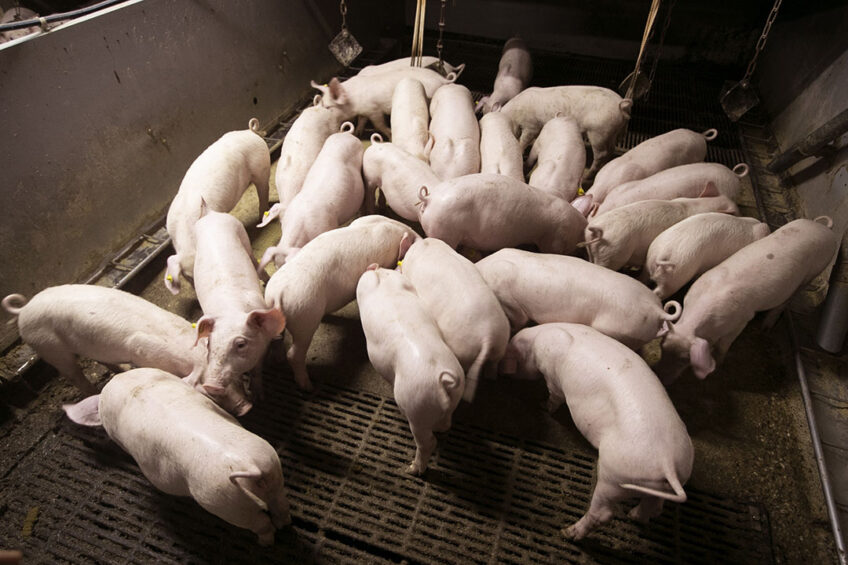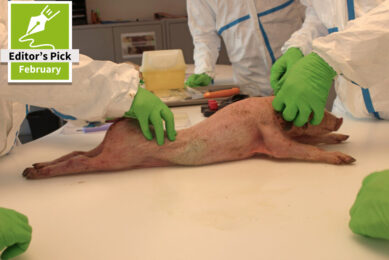Regulating calcium level in pigs’ diets to buffer gut health

Gut microbiota is involved in nutrient utilisation, absorption, metabolism, and modulation of host immunity, which in turn affects host animal health and production efficiency.
In the post-weaning period, the pigs’ gut microbial ecosystem undergoes massive fluctuations, and they experience substantial changes in their gut physiology, microbiology, and immunology. Thus, post-weaning pigs are more prone to intestinal and immunological disturbances than older pigs.
One of the most abundant beneficial bacterial groups in pig’s gut that are reduced after weaning is the genus Lactobacillus. Lack of these beneficial bacteria associated with the mucosa allows harmful bacteria to adhere to gut cells and to proliferate with negative consequences for gut health.
Consumer pressure on antibiotic reduction
Due to the public demand to reduce antibiotic use in swine production, dietary intervention is considered a major factor to enhance gut health post-weaning. Studies suggest that dietary supplementation of calcium is a potential strategy to modulate the gut microbiota in pigs, reducing the number of harmful bacteria and increasing the number of lactobacilli. Therefore, regulating dietary calcium level is essential to improve pig’s health and performance.
Calcium
Calcium is the major mineral component of the skeletal system, and it is an essential nutrient required for blood clotting, nerve conduction, muscle contraction, endocrine and hormone secretion in all stages of growth, gestation, and lactation.
Calcium requirement in pigs
The National Research Council estimates requirements of 0.66% calcium for growing pigs of 25–50 kg body weight. The requirements are higher for younger pigs and lower for finishing pigs. For gestating and lactating sows, calcium requirement is influenced by stage of gestation, parity, and milk production. The higher calcium requirements during late gestation are due to rapid foetus development.
Factors affecting gut microbiota in pigs
Gut microbiota composition and distribution might co-evolve with the host and may be subtly influenced by various factors such as host factors, diet, feeding management and environment, and feed additives. Host factors consist of intestinal region, age and growth stage, breed, gender, and production performance. Diet contains feed type, feed ingredients, energy resource, protein limitation and amino acid balance. Feeding management and environment include weaning, altitude, region, feeding mood and maternal factors. Feed additives comprise antibiotics, probiotics, prebiotics, essential oils, and organic acids.
Gut microbiota and intestinal integrity: How does dietary calcium work?
Dietary calcium level above the requirements is considered disadvantageous for post-weaning pig’s health by potentially compromising gut barrier function. However, there is evidence that adequate dietary calcium may regulate pig gut microbiota and promote intestinal integrity as well. High-calcium diets containing 10-15 g calcium per kg increase Lactobacillus species growth in the growing or weaned pigs’ gut. In general, calcium intake over 14 days increases Clostridium cluster in the ilea, caeca, and colons of weaned pigs. Several species of Clostridium cluster produce butyrate, which is an important energy source for gut cells. The intestinal maturation stage is another factor affecting gut microbiota composition. For instance, Enterococcus species in the ileum decrease and increase in growing and weaned pigs, respectively, after calcium supplementation.
Concluding remarks
Dietary composition largely influences pig’s gut microbiota and represents a useful preventative tool against gut disturbances in post-weaning pigs. The gut microbiota communities of swine are subtle to several internal and external factors. Regarding the public demand to decrease antibiotic use in swine production, dietary intervention to promote gut health and integrity is getting more attention these days. Therefore, information on selective stimulation of certain beneficial bacterial groups may be useful for diet formulation for pigs in post-weaning period.











